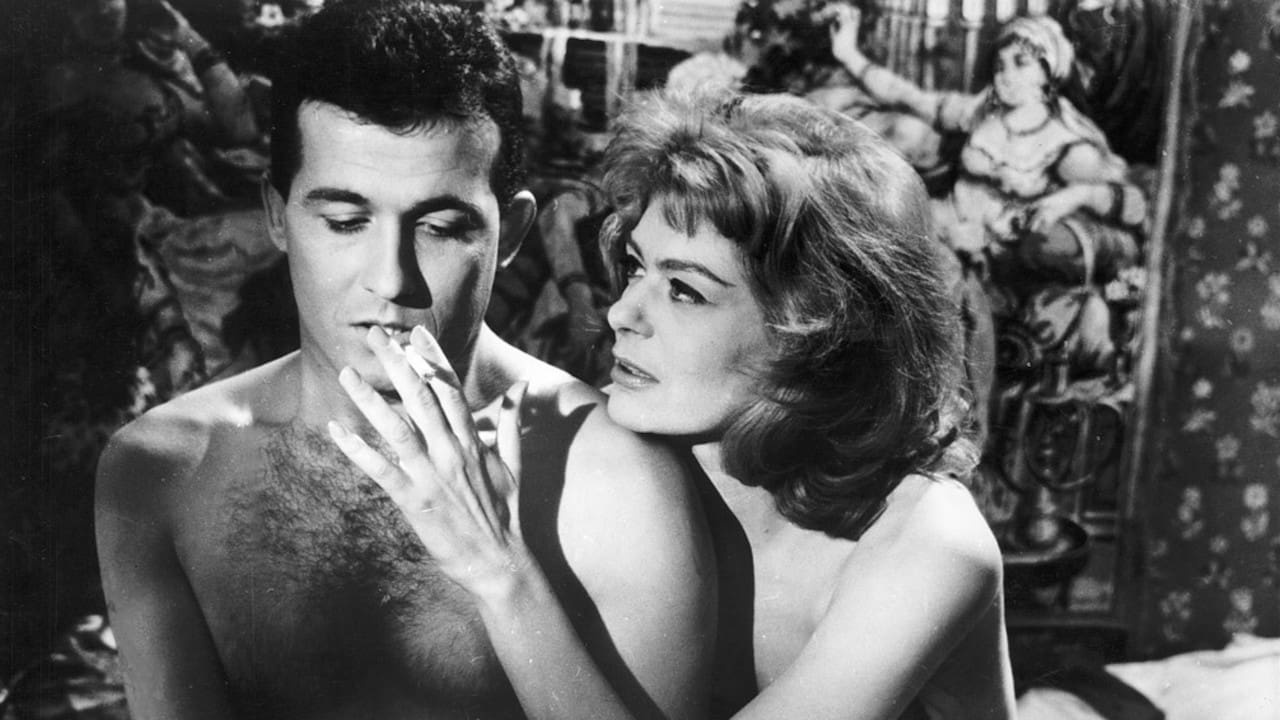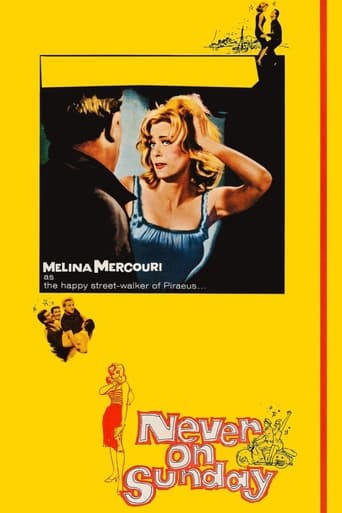

Greek film "Never on Sunday" is a perfect film for all those viewers who appreciate good cinema and have already seen films directed by Jules Dassin namely Rififi, Topkapi and Celui Qui Doit Mourir. Never on Sunday is a simple philosophical film with sufficient doses of light philosophical lessons. A philosophy professional would feel music ringing in his/her ears when the names and teachings of great Greek philosophers namely Socrates, Plato and Aristotle are uttered. The film's star cast includes director Jules Dassin who is paired against his wife Melina Mercouri, one of Greek cinema's best known actresses who was also active as the minister of culture in her native Greece. For 'Never on Sunday', the difficult subject of prostitution is treated in a non controversial, non didactic manner. In many ways this has become a weak point for the film as such a tough topic requires more attention both from director as well as audiences. Much of the film is based on the meditative curiosity which an American tourist displays regarding the profession of a practical harlot upon his arrival at the island of Piraeus, Greece. As the film was made in 1960s, a time of black and white films, there is virtually no skin show. Hence, one can go ahead and watch it with family members without bothering about any polemical content.
... View MoreThe plot resembles that of "Born Yesterday," in which an intellectual tries to reform a low-brow woman. Except that this is not about Judy Holliday but about Melina Mercouri, a Greek whore who likes her life style and believes that every story ends happily. The film is drenched in the Greek pop tunes of Manos Hatzidakis, so much so that it's almost a musical. For a while the theme song was heard everywhere. It's in black and white but no one should be put off by the infrequent subtitles.I was surprised to find I could understand some of the Greek. Years ago I had a class in the language. I don't like to brag but one day the class was reciting in unison some phrases that the instructor from Athens was trying to implant in our indolent brains and he interrupted the lesson. Pointing to me, he asked, "You -- you are Greek?" No. "Your parents, they are Greek?" No. "That's funny because you have a perfect Athenian accent." Later, after studying other languages, I found I had no talent for learning them at all. My talent was for imitating the voices of other people, like an impressionist. It had been the instructor who'd had the "perfect Athenian accent". Now, you may think that this anecdote has absolutely nothing to do with a review of the movie, but that's only because you aren't thinking about it enough. Give it some effort and -- well, it's pretty deep.Junes Dassin, the director and male lead, is Homer Thrace, the idealistic Grecophile who comes to Piraeus to discover what made the Ancient Greeks so hot, in hopes that, having found the answer, the whole unhappy world of 1960 can be transformed. The greatest pleasure, said Socrates, Plato, and Aristotle, is found in the exercise of the mind. Dassin takes Mercouri under his tutelage for two weeks and tries to transform her, to persuade her to shed her Jungian sensation-type ways and get with the usual program -- Bach's cello solos, Picasso, the climate of Iceland.He's got a tough job. Mercouri has a way of keeping herself happy no matter what's going on. She loves to see performances of "Medea," a terrible tragedy about a jealous, bitchy wife who slaughters her own children out of spite. In Mercouri's interpretation, Medea was lying about the murders just to get her husband's attention. "Oedipus Rex" is a happy play because it's about a man's love for his mother. Everything always ends happily and "they all go to the sea shore." At times it's very amusing.In the end, Dassin is defeated by Mercouri and the other whores who line the streets of Piraeus, as in fact they did at the time. Dassin loses his expression of awe, gets drunk, does a silly dance with the others in the tavern and shouts at Mercouri, "You're beautiful -- but you're dumb." She's not really so dumb. After all, she belongs to an established cinematic genre -- the happy peasant. The movies are full of them. Nationality doesn't count. They all share the same habits. They're happy in their work (usually having something to do with the earth), they sing, they dance, they eat with gusto (al fresco, weather permitting), they smile, they love life, they wear colorful costumes, and they don't mind a drink now and again. The only time they're serious is when they attend some religious ritual.Dassin isn't really much of an actor. He overacts, but then so does Melina Mercouri and just about everyone else, so it hardly detracts from an appreciation of the film. Mercouri is not stunningly beautiful, and she's burdened with a somewhat abrasive voice, but she has a splendid, long-limbed figure and her character is full of charm.Dassin the screenwriter has injected some thought-provoking exchanges into the dialog but they're pretty lightweight and get lost somewhere along the way in this story of a whore who has found that the greatest happiness comes from acceptance and love, not from Bach's cello solos. There's a downside to this attitude, of course, but the movie doesn't bring it up. Living for the moment leads to neglect of the past, not just of Plato but of his sacred olive tree which sits abandoned except for a small circular fence next to a noisy and smoggy highway. And the marble of the Acropolis sizzles in the acid rain like a giant Alka Seltzer.
... View MoreThis movie is almost wonderful and it is totally due to Ms. Mercouri's efforts. She steals every scene she is in by just being fabulous to watch, not unlike Magnani was or Garbo. It was the misfortune of either her choice or her director's to put Jules Dassin in the primary male role. I have not seen such self-aware acting since high school plays. His gestures are huge and overblown and one is completely aware all the time of his actory acting getting in the way of his losing himself in the character. In that Ms. Mercouri eventually married him, I must conclude she had something to do with his being cast. What a fatal error. It is almost embarrassing to watch him. One is begging for the hook to swing onstage and grab him away. I can only suspect his primary experience before this was in live theatre where the exaggerated posturing he's adept at would not have been so obvious, perhaps to audiences of that time. Now, he looks as out of place as a silent film star in talkies who cannot figure out what to do next with his voice. Such a shame. He isn't even as awkward as someone picked up on the street in naivete because he might look like 'everyman'--all due to his staginess. The conclusion is, the film hasn't aged well and only because of his lame performance. Watch it for Melina and use his scenes to steal to kitchen for some treats in between.
... View MoreNo one else in the history of cinema became a star in America playing a sexpot at the age of 40. Melina Mercouri did. "Never on Sunday" is why.Aided immeasurably by Manos Hadjidakis' unforgettable score (you're probably already humming the theme) and Jules Dassin's story, Mercouri's incredible presence stole the show -- and hearts worldwide.Dassin is perfect in what would be the "nebbish" role, were he Jewish. The Greeks have, perhaps, 27 words for "nebbish" as they do for "love." Dassin brilliantly inhabits one of them.Rarely has the energy and life force of a particular time and place been so economically and delightfully captured on film.There's a reason "Never on Sunday" is a legend and part of every serious film lover's collection. Once you've seen it, you'll know.
... View More